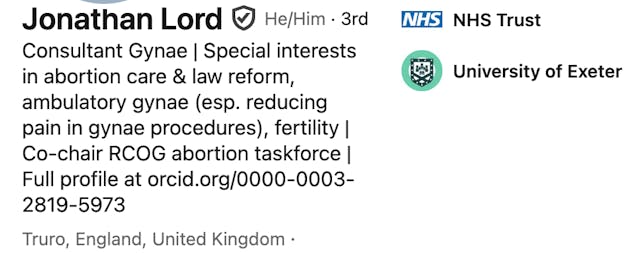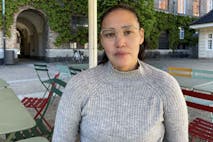My undercover investigation into UK anti-abortion groups Women are being given dubious medical advice and dogma-driven counselling With mental health services overstretched, experts warn these groups are likely to attract the most vulnerable thetimes.com/article/4b7c5f…

UK outlet's 'gotcha' piece on pro-life post-abortion help misses the mark
UK outlet's 'gotcha' piece on pro-life post-abortion help misses the mark
The Times recently did an "undercover investigation" into the supposedly hidden agenda of the pro-life movement, which includes offering women 'abortion pill reversal' as well as post-abortion regret counseling.
But despite its best efforts at a "gotcha," The Times simply proved that the pro-life groups offering assistance do exactly what they claim to do.
Key Takeaways:
The Times attempted to run a hit piece on pro-life organizations dedicated to helping women with abortion regret, yet failed to show any proof of wrongdoing.
The Times' correspondent Constance Kampfner called Rachel's Vineyard, a pro-life organization, telling them she was having doubts after taking the abortion pill — then rebuked Rachel's Vineyard for offering her the help she had requested from their helpline.
Kampfner called another organization for help with her self-proclaimed abortion doubts, but criticized that group for claiming she may have emotions related to those doubts, accusing them of causing women to then have those emotions.
Kampfner seemed shocked that the advice from a pro-life activist at a pro-life organization was, in fact, pro-life.
In her 'investigative report,' Kampfner denied that abortion trauma exists, yet advised women with abortion trauma to seek help from abortion facilities, which she admitted have 'limited' mental health options. She also advised women to seek post-abortion mental health care from 'secular' groups, while admitting there is a two-year waiting list.
The Details:
Constance Kampfner, a correspondent for The Times, recently published an undercover investigative report into pro-life counseling for abortion regret.
Pretending to have taken the first pill in the abortion pill regimen, Kampfner called Rachel's Vineyard about 'abortion pill reversal' (APR), and spoke with Rachel Mackenzie, whom she calls "one of Britain's foremost anti-abortion activists." Mackenzie had previously been helped by Rachel's Vineyard to overcome her own abortion regret.
"I have called her helpline to say that I am in early pregnancy and have taken one of two sets of prescribed abortion pills," wrote Kampfner. "I explain it is not the right time for me to become a mother, but that I am experiencing some doubts and am looking for advice."
Kampfner didn't say what she expected a pro-life activist at a pro-life organization to say about her fake abortion doubts, but she seemed shocked that Mackenzie's advice was, in fact, pro-life.
Abortion experience and regret
Kampfner told Mackenzie she had taken the first drug of the two-drug abortion pill regimen and was having doubts about it. Mackenzie, willing to be vulnerable, shared her personal abortion story and how it was "the worst decision I ever made in my life."
Wanting to spare Kampfner from that same pain, Mackenzie offered to connect her with a doctor who could provide "abortion pill reversal" (bioidentical progesterone administered in an attempt to outcompete the effects of mifepristone). But rather than see the compassion and vulnerability in Mackenzie's words, Kampfner claimed that APR is "strongly discouraged in the UK" — as if Mackenzie were trying to trick her.
At one point, Kampfner said that women she knows who have had abortions "seem ok." Mackenzie shared:
"My first reaction when I had my first abortion was relief. My problem had gone away. And then years later it dropped, ‘What have I done?’"
This is common for many women, but Mackenzie's advice fell on deaf ears.
Kampfner wrote of APR, "The medication contains a high dose of progesterone, which is said to increase the chances of a woman being able to continue with her pregnancy." It is accurate to say that progesterone has been shown to disrupt the mechanism of mifepristone. What's not accurate is what Kampfner wrote next.
'Abortion pill reversal'
Regarding APR, she said, "However, the Royal College of Obstetricians and Gynaecologists (RCOG) says it is unproven and unethical. The first controlled clinical study of the pill’s effectiveness was abruptly halted in 2019 after three participants were taken to hospital with severe bleeding."
The study she mentioned actually showed the opposite of what the pro-abortion RCOG and Kampfner claimed.
Study shows opposite of media claims about APR
As Live Action research fellow Carole Novielli explained, 40 pregnant women were to be recruited for the study, but ultimately, only 12 were. Those 12 were to take the first of the two pills (mifepristone) in the approved abortion pill regimen, and then were given either progesterone to try to save their preborn children or a placebo.
"The mere suggestion of using pregnant women in this kind of study raises ethical concerns," wrote Novielli. "...The study was abruptly suspended and later terminated ... following three instances of 'severe hemorrhage requiring ambulance transport to hospital.'"
Heavy bleeding and hemorrhage are known “risks” of mifepristone, not progesterone, which has been used for decades in an effort to help prevent threatened miscarriages. It is estimated that using progesterone when a miscarriage is threatened could save over 8,000 preborn children each year.
A breakdown of the study results Kampfner cites shows that the bleeding was connected to the abortion pill, not APR.
Article continues below
Dear Reader,
Have you ever wanted to share the miracle of human development with little ones? Live Action is proud to present the "Baby Olivia" board book, which presents the content of Live Action's "Baby Olivia" fetal development video in a fun, new format. It's perfect for helping little minds understand the complex and beautiful process of human development in the womb.
Receive our brand new Baby Olivia board book when you give a one-time gift of $30 or more (or begin a new monthly gift of $15 or more).
In fact, of the 12 women:
Two dropped out — including one who took the placebo and had "increased anxiety about bleeding."
Five took progesterone with four having continued pregnancies after two weeks and one having "brisk bleeding" with no gestational sac found and "no intervention was needed."
Five took the placebo following the mifepristone. Two had continued pregnancies after two weeks; one had no gestational heartbeat after three days and had an uneventful surgical abortion; one "called an ambulance after experiencing hemorrhage" and was given "a 1-unit transfusion of packed red blood cells"; and the last "called an ambulance after onset of heavy vaginal bleeding" and required a surgical abortion.
Women not given progesterone appear more likely to suffer heavy bleeding after taking mifepristone. This study further demonstrated the risks of mifepristone and the effectiveness of abortion pill reversal. But the media presented the opposite narrative.
Bleeding risk
Mackenzie then discussed Dr. Dermot Kearney, a cardiologist who administers APR to mothers experiencing regret who are hoping to save their babies after taking the abortion pill. Kampfner quoted a spokesperson from one of the UK's largest abortion groups, the British Pregnancy Advisory Service (BPAS), who claimed that doctors who offer APR are the ones putting women "at risk" and "should be investigated."
Kearney confirmed that it is mifepristone that has the risk of heavy bleeding, and that progesterone "may reduce the risk of severe haemorrhage” that could be caused “as a result of the prior administration of mifepristone."
The Times then quoted Dr. Jonathan Lord, co-chair of RCOG's "abortion taskforce" whose Linkedin page says he has "special interests in abortion care & law reform."

Lord defended the abortion pill by saying it is "exceptionally rare" for a blood transfusion to be needed with mifepristone — but Kearney never claimed that women needed blood transfusions because of mifepristone; he said they were likely to experience heavy bleeding, a proven risk.
Helping women who have abortion regret
A few weeks later, Kampfner called Mackenzie again to say she went through with the abortion but still had doubts. But Kampfner rebuked her help, again.
Sensing that a Rachel's Vineyard retreat may not be an appropriate fit for Kampfner, Mackenzie recommended another group called Image, which helps women address "unresolved feelings" about an abortion. But Kampfner claimed that Image's information on common feelings of "shame," "anger," "blame," "grief," and "forgiveness," signify that Image has a "clear anti-abortion agenda."
Despite efforts by the abortion industry to bury the truth about abortion-related emotional trauma, such trauma does exist:
Letters from post-abortive women "indicate that prolonged grieving after abortion may be a more widespread phenomenon than previously believed."
Testimonials show the pain of abortion.
A study claiming that women don't regret abortion was heavily debunked.
The counselor at Image told Kampfner that she didn't sound like she was struggling with her decision to abort, but offered her continued support anyway, because, after all, Kampfner had reached out to them.
For Kampfner, this is some sort of red flag. She wrote, "[The counselor] is empathetic throughout and does not explicitly tell me that having an abortion was wrong. Yet I feel I am being encouraged to view it as something to regret, with words including 'trauma' and 'grief' introduced without me bringing them up."
It's unclear why Kampfner would call an abortion regret organization and expect them not to ask her about her regret.
Minimal acknowledgement of abortion trauma
Thankfully, Kampfner did not attend a Rachel's Vineyard retreat, realizing that the women there are "vulnerable" and grieving, and may share experiences of sexual violence. However, she mocked grieving parents for naming their aborted babies by putting the word children in quotes, as if their babies were not actually children.
Though Kampfner seemed to think it ridiculous that women might regret abortion, she interviewed a woman named Emma who used BPAS for abortion and was left feeling "angry and alone." Emma confirmed that "her [post-abortion] grief was taboo within pro-choice circles."
Kampfner admitted that even BPAS offers counseling for abortion trauma, but BPAS failed to follow through with Emma's emotional needs. And though Kampfner said women should seek help for "support" for "underlying traumas" that abortion might 'trigger,' she admitted it can be difficult to get that appointment because there is an up to two-year wait time for mental health treatment through the UK's NHS.
The Bottom Line:
Kampfner's attempt to catch abortion regret organizations tricking women was a failed experiment. She called organizations that help women with abortion regret, pretended to potentially have abortion regret, and then tried to slander the organizations for providing the exact services they advertise.
Live Action News is pro-life news and commentary from a pro-life perspective.
Contact editor@liveaction.org for questions, corrections, or if you are seeking permission to reprint any Live Action News content.
Guest Articles: To submit a guest article to Live Action News, email editor@liveaction.org with an attached Word document of 800-1000 words. Please also attach any photos relevant to your submission if applicable. If your submission is accepted for publication, you will be notified within three weeks. Guest articles are not compensated (see our Open License Agreement). Thank you for your interest in Live Action News!
Read Next

Activists arrested for blockading doors at TN Planned Parenthood
Nancy Flanders
·More In Analysis

Opinion
Can IVF ever be ethical? Here are some things to consider.
Nancy Flanders
·
Investigative
Pro-abortion Guttmacher's 'policy solutions' prove they see parents as an enemy
Carole Novielli
·
International
Greenlandic victims of Denmark's 'parenting tests' still don't have their children back
Cassy Cooke
·
Analysis
Mother uses her tragic 20-week abortion to advocate for more death
Nancy Flanders
·
Analysis
Tragic: Couples fight over embryos as possessions in divorce cases
Cassy Cooke
·More From Nancy Flanders

Activism
Activists arrested for blockading doors at TN Planned Parenthood
Nancy Flanders
·
Opinion
Can IVF ever be ethical? Here are some things to consider.
Nancy Flanders
·
Investigative
Chicago Planned Parenthood client collapses outside: 'They threw me out'
Nancy Flanders
·
Analysis
Mother uses her tragic 20-week abortion to advocate for more death
Nancy Flanders
·
Politics
Supreme Court hears oral arguments in pivotal NJ pregnancy center case
Nancy Flanders
·